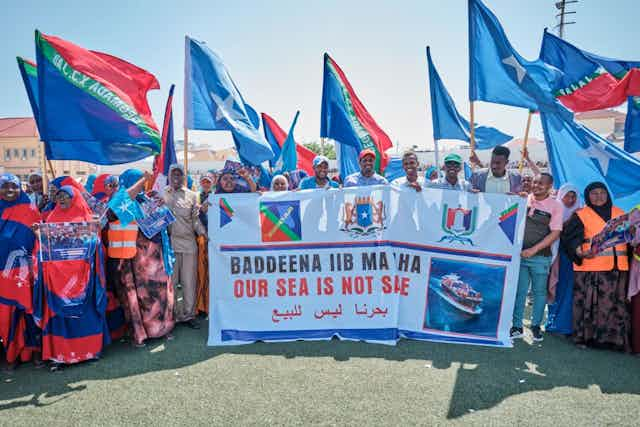Somaliland declared itself an independent state in 1991. It used colonial boundary lines to separate itself from Somalia. More than three decades later, however, it has yet to gain international recognition. It has had a difficult relationship with Somalia. A recent memorandum of understanding to grant landlocked Ethiopia access to the sea threatens the relationship further. But it could support Somaliland’s quest for recognition as an independent state. We asked Aleksi Ylönen, who has studied politics in the Horn of Africa and Somaliland’s quest for independence, some questions about this situation.
1. What has Somaliland achieved in its quest for statehood?
Somaliland unilaterally declared its independence in 1991, based heavily on its separate colonial experience from Somalia. Britain declared a Somaliland protectorate in 1884. Italy established another protectorate, which became a colony, in 1889.
British Somaliland gained independence on 26 June 1960. It voluntarily joined the former Italian Somaliland upon its independence on 1 July 1960 to form Somalia.
This union was never formally ratified and eventually fell apart.
In the decades since 1991, Somaliland’s people and their representatives have emphasised their distinct colonial status and associated borders. Regional organisations and foreign powers have adhered to colonial boundaries when recognising independent states in post-colonial Africa.
Somaliland’s political system is democratic in a neighbourhood of authoritarian states like Djibouti, Eritrea, Ethiopia and the Sudans.
Somaliland has organised successful elections and peaceful transfers of political power. Recently, however, there has been some backsliding.
Its security apparatus is elaborate. With the active contribution of citizens, it has ensured a measure of internal stability and security in an otherwise troubled region.
No United Nations member state or global organisation recognises Somaliland’s independence officially. Still, Somaliland has unofficial diplomatic relations with various UN member states. It also maintains relations with other marginalised nations and territories and partially recognised Taiwan.
Several foreign nations have representative offices in its capital, Hargeisa. It maintains liaison offices in 20 countries on five continents.
2. How would you describe the relationship with Somalia?
It’s turbulent.
The Federal Republic of Somalia rejects Somaliland’s independence and agreements with foreign parties. Meanwhile, Somaliland has accused Mogadishu of involvement in the conflict in its eastern territories.
Negotiations over their relationship have taken place from time to time since 2012, with little progress.
Ethiopia’s recent announcement of a memorandum of understanding with Somaliland has set back relations between Somaliland and Somalia even further.
Ethiopian prime minister Abiy Ahmed and Somaliland president Muse Bihi Abdi in January announced a plan to give Ethiopia access to 20km of the Somaliland shoreline.
In exchange, Ethiopia said it would seriously consider Somaliland’s aim of international recognition. The exchange also included Somaliland getting a stake in Ethiopian Airlines or EthioTelecom.
The government of Somalia reacted swiftly to this announcement.
It held an emergency parliamentary session and withdrew its ambassador from Ethiopia for consultations. It also declared the proposed deal “null and void” and a sign of Ethiopian “aggression” towards Somalia.
3. What other bilateral arrangements has Somaliland signed?
Many of the deals Somaliland has made with foreign agencies haven’t been made public. It does have unofficial diplomatic ties with various countries. It has also made agreements with foreign countries and organisations linked to their political elites.
These include deals around infrastructure development and management, as well as investment and natural resource extraction.
Ethiopia-Somaliland ties have been strong for decades.
In the early 1980s, Addis Ababa provided sanctuary for the Somali National Movement, which sought to topple the repressive Siad Barre administration in Somalia.
In the 1990s, Ethiopia eyed Somaliland as a possible import-export route to the sea to lower its reliance on Djibouti.
As a result, Dubai Ports World, a state-linked United Arab Emirates ports and logistics company, agreed with the Somaliland administration to develop and manage the Berbera port in 2016. Two years later, Ethiopia agreed to take a 19% stake in a Berbera port consortium.
Although Ethiopia didn’t follow through, it still had plans for a logistics corridor through Somaliland.
4. What can Ethiopia offer Somaliland on the independence issue?
The understanding between Addis Ababa and Hargeisa includes a provision for an in-depth assessment of Somaliland as a sovereign state. This would make Ethiopia the first UN member state to recognise it.
It would give Somaliland what it wants most. Recognition would help open doors for international public financing and raise Somaliland’s status in the region.
Ethiopia seems committed to the proposed deal. Some of the reasons for this include:
its wish for sea access
its strong ties with Somaliland
national security advisor Redwan Hussien’s comments that discussions would include other sectors of collaboration. Ethiopia is already talking to Somaliland about military cooperation.
Somaliland is holding a long-delayed presidential election towards the end of 2024. Gaining international recognition would likely give President Muse Bihi Abdi a second term in office, even though he has been criticised for mishandling the conflict in Somaliland’s eastern borderlands. People in this area have tried to set up their own state as part of federal Somalia.
5. Why has Somaliland made so little progress and what needs to change?
Achieving recognition has been a foreign policy priority for Somaliland. All administrations have made efforts to raise awareness about its situation internationally.
But international politics have not favoured Somaliland. Most states, including great and middle powers, fear that recognising Somaliland could be destabilising. They have opted to support unity, and peace and state building of federal Somalia.
One of their reasons for non-recognition is that Somaliland’s 1991 self-declaration of independence may appear illegal under international law.
In my view, it’s wrong to think that dividing up states inevitably causes instability and conflict. Each case is unique and deserves consideration based on historical and legal arguments, as well as current conditions.

